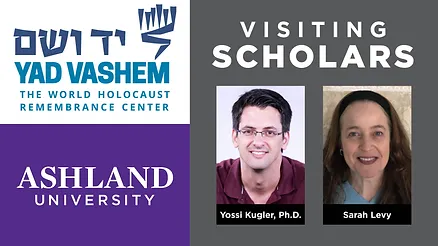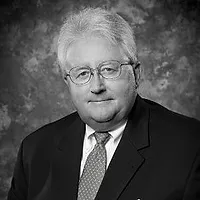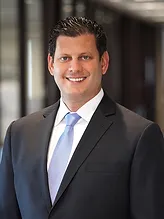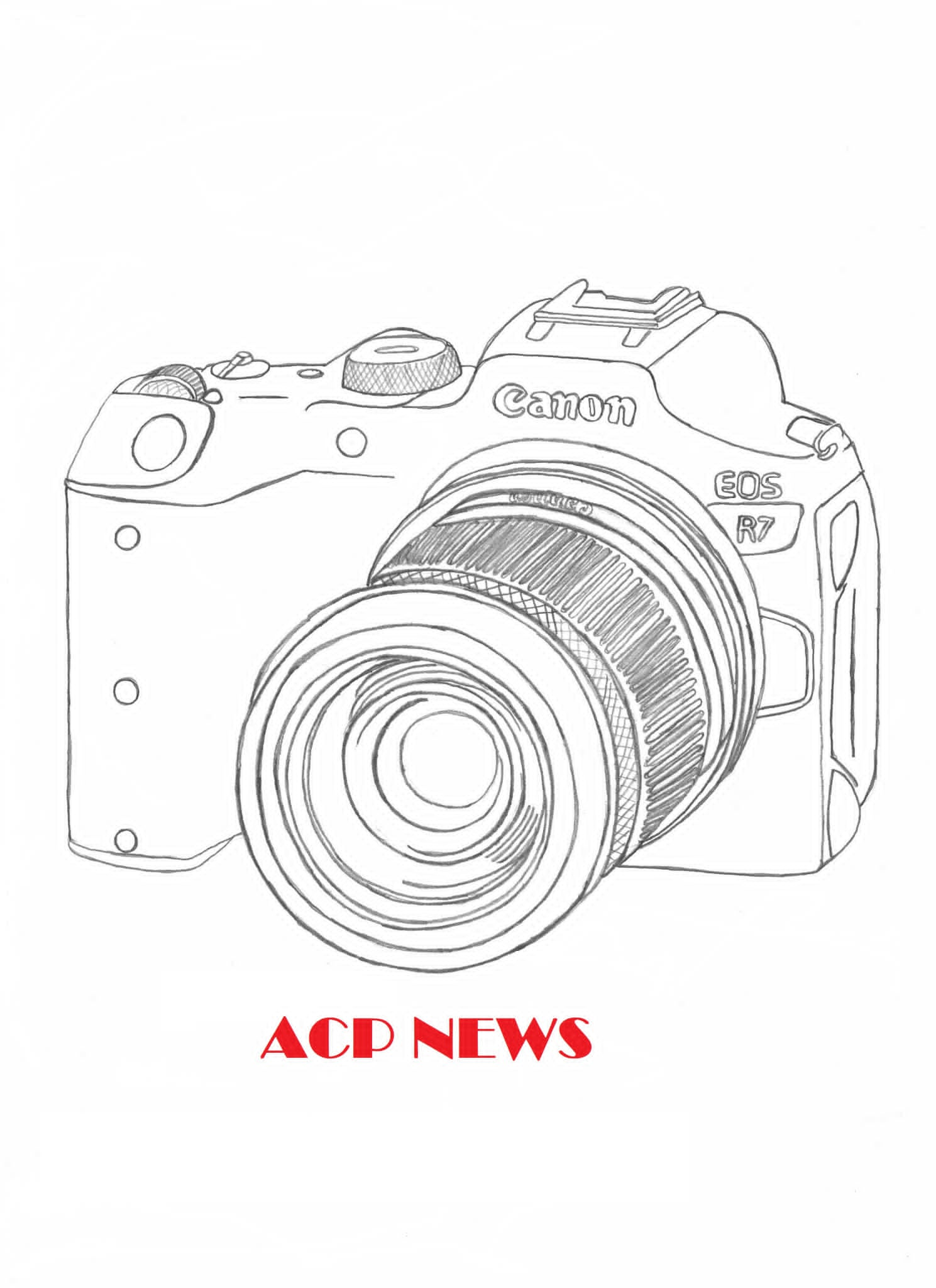 ASHLAND, Ohio – Leaders at Ashland University and alumni of the school are embracing the opportunity to raise awareness and a greater understanding of the history of Jewish people, the Holocaust and today’s antisemitic threats, having formally partnered with Yad Vashem, the World Holocaust Remembrance Center.
ASHLAND, Ohio – Leaders at Ashland University and alumni of the school are embracing the opportunity to raise awareness and a greater understanding of the history of Jewish people, the Holocaust and today’s antisemitic threats, having formally partnered with Yad Vashem, the World Holocaust Remembrance Center.
As previously announced, two visiting scholars—Yossi Kugler, Ph.D., a researcher at Yad Vashem, and Sarah Levy, a program coordinator of Echoes & Reflections—will be joining the AU community for two weeks in February. Now, a schedule of events, most open to the public, has been finalized during their stay:
· From Feb. 12-22, Kugler will be teaching a one-credit political science seminar course, “The Holocaust,” for interested AU students
· On Thursday, Feb. 15, Kugler, in conjunction with the Ashland Center for Nonviolence, will present a public lecture, “Knowledge and Lack of Knowledge in the Holocaust,” at the John C. Myers Convocation Center (Trustees Room) at 7 p.m.
· On Thursday, Feb. 22, at noon, Kugler will be at the Ohio History Center in Columbus as he’s been asked to speak during the Ohio Holocaust & Genocide Memorial & Education Commission meeting
· On Wednesday, Feb. 7, at 4 p.m., Levy will present virtually for the Nancy & David Wolf Holocaust & Humanity Center in Cincinnati
· On Thursday, Feb. 8, Levy will make a series of presentations at the Maltz Museum in Cleveland
· On Wednesday, Feb. 7, and Monday, Feb. 12, Levy will lead a series of seminars for AU education students, area educators and students from Ashland High School and Norwalk High School
“We are extremely excited about this opportunity for AU students, regional educators and local high school students to learn more about the Holocaust directly from scholars from Yad Vashem. With few Holocaust survivors still living today, it is more important than ever to continue to tell their stories and remember,” said Charles Neff, D.Min., the executive director of Christian ministry at AU. “Ashland University is proud to be a partner in that effort.”
With the unprovoked Hamas-led attack on Israel on Oct. 7 and the ongoing war there, plus a number of antisemitic incidents occurring in the U.S. and throughout the world, the timing of this programming could not be better. It should be noted, though, that AU’s partnership with Yad Vashem has been in the works since 2020.
AU President Carlos Campo, Ph.D., has made it a priority during his administration to provide impactful initiatives (outside of the traditional classroom) for the students, faculty and staff and Ashland community. This Yad Vashem partnership comes at the perfect time, with antisemitism incidents having taken place on U.S. college campuses, even in Ohio as noted by Gov. Mike DeWine. In a November statement, the governor said in part, “We will not tolerate hate and violence on our college campuses or anywhere in Ohio. These are despicable acts … I will ensure that the State continues our efforts to protect all Ohio students.”
Campo takes that message to heart. “While I’m pleased to report we haven’t had any specific antisemitic threats here at Ashland, we must stay vigilant and eliminate any form of hate. We’re thrilled to welcome Dr. Kugler and Professor Levy to Ashland and look forward to them educating our campus community and the community at-large about the Holocaust and the importance of remaining diligent against the forces and ideas that continue to threaten Jewish people around the world,” he said.
AU is able to welcome these visiting scholars, thanks to the support of Jason Lieberman ‘00 and Jim Smail, a member of the AU Board of Trustees. Lieberman, a Jew, and Smail, a Christian, joined forces for this cause. Despite practicing different religions and being about 30 years apart in age, they developed a bond over a shared vision.
For Lieberman, a vice president/financial advisor and portfolio manager for Morgan Stanley in Boca Raton, Fla., the cause is deeply personal. His grandfather came to the U.S. after the rest of the family nearly all perished during the Holocaust, and when Lieberman made his way to AU in the late 1990s he found few resources for Jewish students like himself. “I lost that part of my life,” he recalled, and now he wants to help “create a better experience.”
 For Smail, the cause is personal in a different way. He always has been a “firm believer in the Bible text that the Jewish people are God’s own people,” and he also feels indebted to a Jewish family that took him “in as one of their own,” at the onset of what became his remarkably successful career in the banking and finance industry. By backing this cause Smail “will honor them and their faith in a very small way.”
For Smail, the cause is personal in a different way. He always has been a “firm believer in the Bible text that the Jewish people are God’s own people,” and he also feels indebted to a Jewish family that took him “in as one of their own,” at the onset of what became his remarkably successful career in the banking and finance industry. By backing this cause Smail “will honor them and their faith in a very small way.”
When Lieberman and Smail woke up to the news of the Oct. 7 attacks, their perspectives and urgency changed. Lieberman, who was vacationing internationally at the time, admitted to a “different level of fear than I’ve felt in my life,” while Smail knew this was the perfect time to act.
“It’s so timely. What better time for (the Yad Vashem scholars) to come in to (educate) our students and anybody else that’s interested on the horrendous persecution that the Jewish people have gone though for centuries … to bring awareness of what happened on Oct. 7 and what the long-term ramifications of that could be … to start a program of educating and uniting Christian students and Jewish students,” said Smail, a strong advocate of the Christians United for Israel organization. “This was started way before Oct. 7, but what happened Oct. 7 gave what we’re doing a whole lot more meaning.”
 Lieberman agreed that bringing awareness is paramount, especially to today’s students many of whom weren’t even born until 60 years after the Holocaust ended. “Lack of understanding and lack of awareness is something I experienced (25-30 years ago). The Holocaust seems surreal, almost something that didn’t happen. If I could help students become aware of this, so that something like this never happens again, that would be the significance to me. This isn’t a Jewish thing, it’s a humanity-type thing,” he said.
Lieberman agreed that bringing awareness is paramount, especially to today’s students many of whom weren’t even born until 60 years after the Holocaust ended. “Lack of understanding and lack of awareness is something I experienced (25-30 years ago). The Holocaust seems surreal, almost something that didn’t happen. If I could help students become aware of this, so that something like this never happens again, that would be the significance to me. This isn’t a Jewish thing, it’s a humanity-type thing,” he said.










